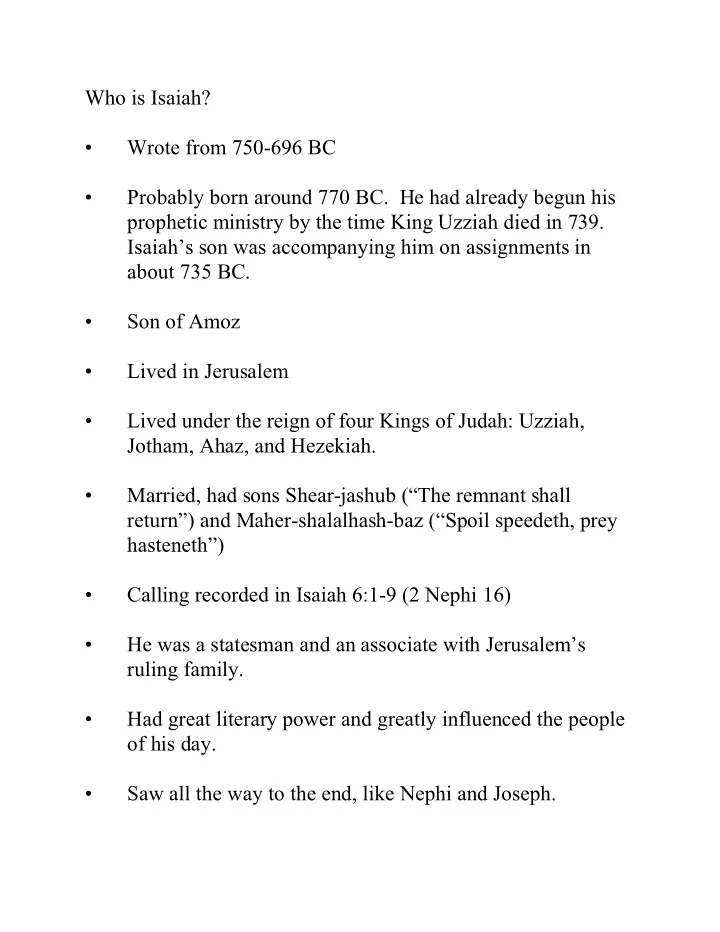

Who is Isaiah? • Wrote from 750-696 BC • Probably born around 770 BC. He had already begun his prophetic ministry by the time King Uzziah died in 739. Isaiah’s son was accompanying him on assignments in about 735 BC. • Son of Amoz • Lived in Jerusalem • Lived under the reign of four Kings of Judah: Uzziah, Jotham, Ahaz, and Hezekiah. • Married, had sons Shear-jashub (“The remnant shall return”) and Maher-shalalhash-baz (“Spoil speedeth, prey hasteneth”) • Calling recorded in Isaiah 6:1-9 (2 Nephi 16) • He was a statesman and an associate with Jerusalem’s ruling family. • Had great literary power and greatly influenced the people of his day. • Saw all the way to the end, like Nephi and Joseph.
Why is Isaiah so Difficult to Read? 1. Isaiah was under divine restrictions not to reveal all the things he knew and saw. Some things may be written so as to be purposefully obscure so that only those with the Spirit or other scriptural keys could understand. 2. “The Lord God hath given me a tongue of the learned.” His literary skill in Hebrew was so advanced that it makes it difficult to translate into another language. 3. He tends to identify kingdoms and nationalities who would be God’s enemies in the latter days with kingdoms and nationalities who were God’s enemies in Isaiah’s days. 4. He takes a poet’s approach and “sweeps through” his visions, moving excitedly and impressionistically from the heights to the depths. He thought nothing of taking a problem which was current in his own time and then, without the slightest warning to this reader, using this as an excuse for immediately discussing an identical problem that he knew would arise in the “latter days.” This often “presents his humble readers with a continuous series of fantastic strides forward, backward, skyward and sideways.”
Elder Bruce R. McConkie’s Ten Keys to Understanding Isaiah. 1. Gain an over-all knowledge of the plan of salvation and God’s dealings with his earthly children. Isaiah wrote to people who already had this knowledge. 2. Learn the position and destiny of the House of Israel in the Lord’s eternal scheme of things. Isaiah’s love and interests center in the chosen people. 3. Know the chief doctrines about which Isaiah chose to write: the restoration of the Gospel in the latter days; the latter day gathering and final triumph of Israel; the coming forth of the Book of Mormon; the apostate conditions of the nations of the world in the latter days; messianic prophesies of the Lord’s first coming; the second coming of Christ and his millennial reign; and historical data and prophetic utterances relative to his own day. 4. Use the Book of Mormon. It is one of the only authentic commentaries on the writings of Isaiah. 5. Use latter-day revelation, for example, selected verses from the Doctrine and Covenants and from the writings of Joseph Smith and other Prophets. 6. Learn how the New Testament interprets Isaiah. He is quoted 57 times there. 7. Study Isaiah in its Old Testament context.
8. Learn the manner of prophesying used among the Jews in Isaiah’s day. Meanings are often hidden in parables. Isaiah used types and shadows to illustrate his points. Descriptions of latter-day events are often discussed using examples from his own day. 9. Have the spirit of prophesy. 10. Devote yourself to hard, conscientious study.
3 Keys to Understanding Isaiah 2 Nephi 25:1 - 8 I. Understand the manner of prophesying among the Jews (2 Neph 25:1) Examples: A. 2 Nephi 17:3, 18:3 – Names B. 2 Nephi 16 - Symbols C. 2 Nephi 13:16-24, 2 Nephi 14:1 – Dualism II. Use the spirit of prophesy (2 Neph 25:4) How: A. Use the scriptures to interpret Isaiah 1. 2 Nephi 21:1-2, use D&C 113:1 - 4 2. 2 Nephi 8:24 - 25, use D&C 113:7 - 10 B. Use the words of the Brethren 1. 2 Nephi 12:1-4 – George Albert Smith 2. 2 Nephi 13:12 – Ezra Taft Benson III. Live in the day of their fulfillment . (2 Nephi 25:7) Examples: A. 2 Nephi 15:26-29 – Modern transportation B. 2 Nephi 27 (Isaiah 29) – Book of Mormon
Recommend
More recommend